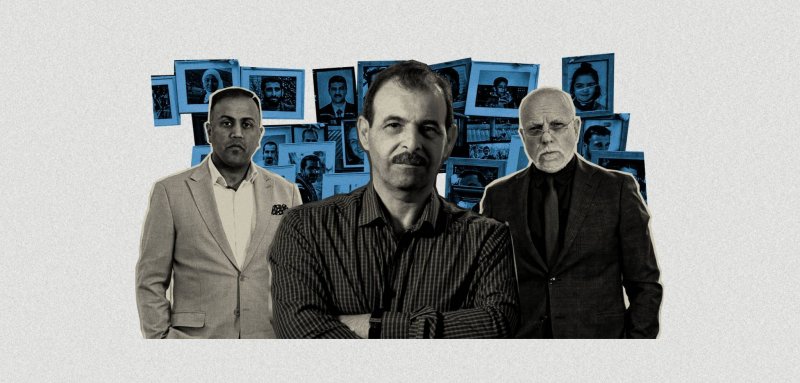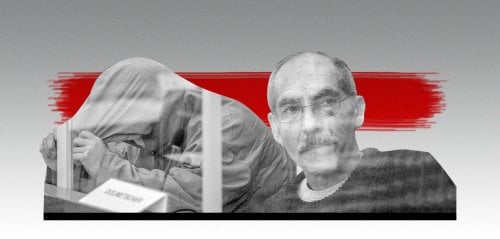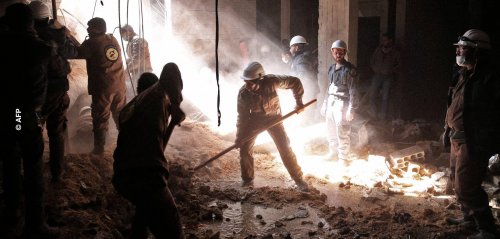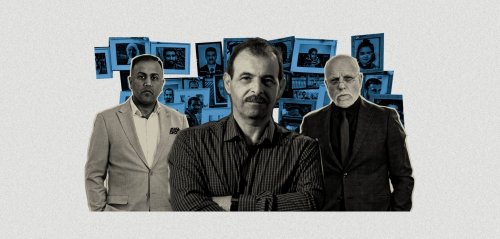On Wednesday 3rd of June 2020 began the 10th trial day of former Syrian intelligence officer Colonel Anwar Raslan, known as the Khatib trial, or Case 251.
The three-day trial session at which Syrian lawyer Anwar Al-Bunni appeared before the court as an expert witness, together with Syrian filmmaker Feras Fayyad, who appeared as the first victim of torture to testify before the Court, and who is a co-plaintiff in the civil case.
The court session on the 3rd and the 4th of June was devoted for one and a half days to hearing the testimony of filmmaker Fayyad. The second half of June 4th and all June 5th continued with the testimony of the Lawyer Anwar Al-Bunni. Al-Bunni was summoned as an expert witness due to the nature of his former work as a human rights lawyer in Syria, and currently in Germany as the president of the Syrian Centre for Legal Studies and Research.
The importance of these testimonies lies in the court’s reliance on witness statements as evidence to convict the accused, in addition to expert and intelligence reports. We also saw before the court for the first time not only reports and stories about torture in Syria, but one of the surviving victims of torture there, one of the four thousand victims whom the defendant Raslan is accused of torturing in Al-Khatib trial.
In an interview in German Fokus magazine, the two lawyers representing victims, Andreas Schulz and Khubaib Ali Mohammed, demanded compensation for their clients from Syrian President Bashar Al-Assad for the torment they suffered in the prisons of the regime.
In an interview for Raseef22, lawyer Ali Mohammed believes that the court will have sufficient evidence to convict and imprison the defendant, and told us that his client Fayyad has described in court the conditions of his detention and torture, in addition to his persistent physical and psychological injuries that he continues to suffer to date as an after-effect of his torture.
On the first day of testimony, Syrian filmmaker Feras Fayyad declared that he would have forgiven Raslan had he confessed his guilt and responsibility and admitted to committing crimes in Al-Khatib , but it is better Anwar Raslan did not admit guilt.
Fayyad explained to Raseef22 his position, saying that he does not seek revenge or personal achievement from this trial as he added: "I would have waived all my personal rights and forgiven him, but denying the torture, and saying that even if there was torture he did not know about it, this is the biggest problem.The shops near the prison heard the screams of the detainees, so how about a person whose office is inside the prison and is very close to the detainees and was inspecting the prison."
Fayyad added: "I have never imagined that one day I would sit in court and see Raslan opposite me in the dock".
Syrian torture victim Firas Fayyad believes the regime is following the trial closely because the defendant Anwar Raslan was close to the governing circle, and knows all the players having worked with them, this trial certainly made them feel threatened
Establishing a path of trust in Justice for us as Syrians, justice that we have never experienced before
Fayyad began his testimony by talking about his life in Syria as a student and filmmaker, and about the moment that has changed everything: the beginning of protests in Syria against Bashar Al-Assad's regime on the 15th of March 2011, where Fayyad filmed and documented demonstrations, arrests, and the police shooting protesters. Furthermore, he taught others how to film and document until he was arrested himself.
Perhaps the most important point in the testimony before the court on the 3rd of June was that filmmaker Firas Fayyad could identify Anwar Raslan. Despite being blindfolded he could still recognize his surroundings. He recognized Raslan as the one who interrogated him in Al-Khatib because of the birthmark which is prominent on his face. It was noticeable, Fayyad could confirm that Raslan is the investigator who interrogated him in Al-Khatib and that the other prisoners said that he was the head of the prison.
In his testimony in court, Firas Fayyad confirmed that he would be able to identify Anwar Raslan from his voice and confirm irrefutably that he was the investigator who interrogated him in Al-Khatib, but Anwar Raslan remained silent and refused to give a sound sample to the court.
In turn, lawyer Anwar Al-Bunni told Raseef22 that he was not aware of any interviews that Raslan has given after his defection, audio or visual, that could be used to identify his voice in court. Raslan has never spoken to the media since his defection. According to Al-Bunni, this reinforces the hypothesis that Raslan is a spy for the regime planted to penetrate the ranks of the Syrian opposition and not a real dissident.
In addition, Al-Bunni declared: "I have always maintained that Anwar Raslan has changed the place of his work only and did not change the nature of his work".
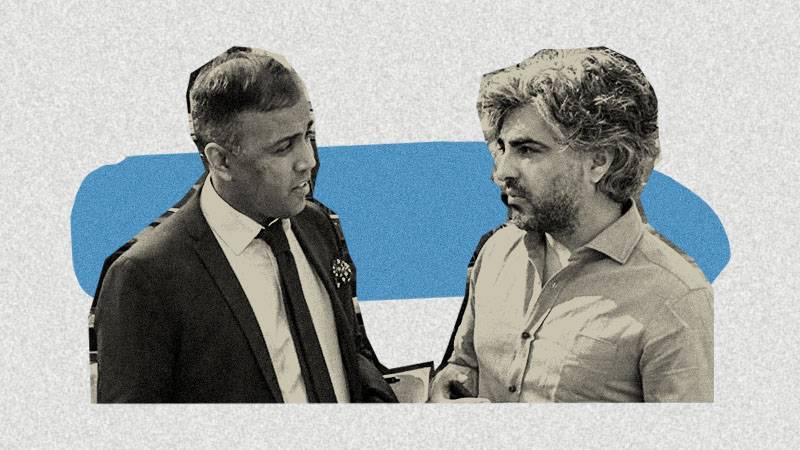
Firas Fayyad sat on the witness seat in Hall 128 of the Koblenz High Regional Court in Germany. He said that he had been in Al-Khatib prison for two or three months, where he was tortured daily, or every other day at the latest. They interrogated him about the films he was making, who he was with, for whom he worked, and whether he was a spy for the Americans or the French.
Firas Fayyad’s documentary "The Cave" was nominated for the Oscars in 2020, and is the winner of the German Film Peace Prize according to Germany's Taz magazine. He confirms to Raseef22 that the importance of his testimony in court is "to establish a path for our trust as Syrians in justice, justice that we have never experienced before, as we lived in a country where there is no justice and no rule of law. This is the basis for recognizing that there is a legal path, a just path, where people who have committed crimes or have been involved in the ravages of the country can be prosecuted. This is the right way".
Fayyad adds that if Anwar Raslan was to be convicted and imprisoned, the trial itself is a message to the regime and proof of the involvement of many of names from the regime, and continues: "Because Raslan in his statement referred to a number of names involved in violations, this is very important, because these names would have never been mentioned if Raslan had not been brought to this court. In addition, we would not have known how Branch 251 works, how these agencies work, and who is directly and indirectly responsible for the actions, and Raslan has mentioned all these methods in his statement."
Thus, Fayyad asserts that: “Raslan was a very important gateway for all these names to be mentioned and to be put under investigation and prosecution. Raslan proved in his statement that these names were the ones who did this deed on this particular date, and that he was a witness to that. The same applies to the defendant Eyed Al-Ghraib, who also mentioned a number of names. If it were not for this ongoing trial, the other names would have not been known, and the defendants would have not volunteered to disclose this information on their own".
Firas Fayyad believes that the regime in Syria is following this trial closely because the defendant Anwar Raslan was close to the governing circle, and he knows all those names and worked with them, and this trial certainly made them feel anxiety and fear. Therefore, they will start to think about the past and the future, and some might even consider stopping the torture.
Fayyad added: "The trial is very important for Syria and the Arab world, first of all because it’s a message to all the corrupt and the war criminals and those who intend to be part of any corrupt regime. In addition, this trial is important for people to know that there is always a way to gain their rights, no matter how big, supported or deep rooted the perpetrators might be. The world has changed and those who have rights can pursue criminals in places that were not imaginable before."
Additionally, Fayyad proclaimed :"No one in the Arab world should be silent about his right and no man who abuses the laws and the constitution for his own personal gain should be left in power. If the Arab citizen does not fight for himself, let him fight for his children and the future generations, because this is a struggle for the land and for justice.
Despite being blindfolded, Firas Fayad could still recognize his surroundings and his torturer Anwar Raslan because of the prominent birthmark on his face and his voice. Raslan refused to give a sound sample to the court
"My Experience as a Detainee in Secret Service Prisons and my Knowledge of What Happens Inside Them"
In his testimony in court on the afternoon of June 4th, lawyer Anwar Al-Bunni said that Anwar Raslan was part of the regime's machine that exercised systematic torture.
In his talk with Raseef22 , lawyer Al-Bunni declared that " this time it is important for me to appear as an expert witness in court because of my thorough knowledge of the security and legal structures that protect the police, security apparatus and military personnel from prosecution in Syria.”
He adds: "In addition to my experience as a lawyer defending detainees, I know the conditions of prisons, what the detainees suffered from and what were the reasons for their detention, how long they remained without lawyers or meeting their families, or disappeared altogether. In addition to my previous experience as a detainee in these secret service prisons myself, and my knowledge of what happens there, this is similar to what happened with the victims of Al-Khatib prison, whom I represented after 2011."
In response to the statement made by the defendant Anwar Raslan in court on May 18th, 2020, where he denied all allegations in the indictment against him, lawyer Anwar Al-Bunni asserts that much of Raslan’s statement is false and incorrect. Even regarding the details of the prison from the inside, which he is familiar with because he was imprisoned there in 1978 and he asserts: "When I see Anwar Raslan's full statement, I will point out to the court many false claims."
Al Bunni proclaims to Raseef22 :"Since we started collecting files and documents, the regime was not certain how serious is the case, they thought that everything could be resolved in a political settlement later. Now they know that the issue is very serious, and that they cannot hide anywhere in the world, so the issue is very important for them”.
Al-Bunni cannot say for sure whether the trial has helped to stop some of the torture taking place in Syria or not, but he believes that it may help alleviate some of the suffering. “We can’t be certain because for two years no one came out of the detention centers to tell what was happening there” he said.
In response to the view that such trials would discourage members of the regime from defecting Al-Bunni declares to Raseef22: “Whoever wants to defect now we don’t want him, even if he defects, he is a criminal. It is like going to a pilgrimage and saying now I atone for all my earlier sins by deflection!"
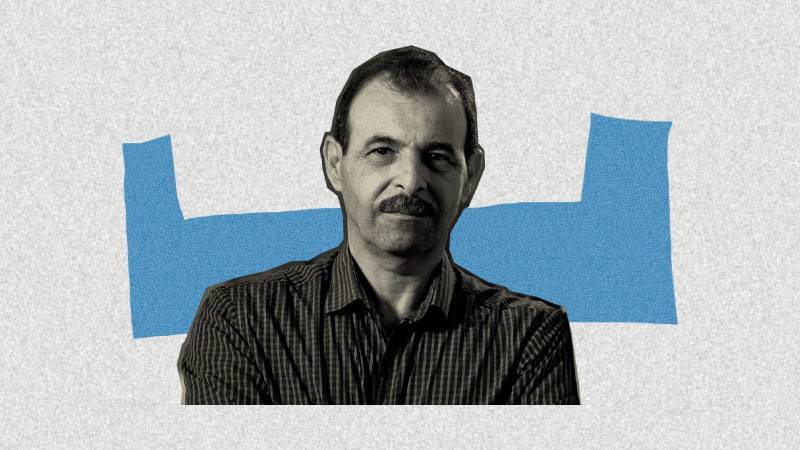
“Section 251 was free to do what it saw fit “
Anwar Al-Bunni’s testimony in court included several points among which that Syria was always governed by the secret service, and that one of the tools of repression was particularly Branch 251, the internal section of the Syrian intelligence which controls everything.
When asked if there was a difference in the secret service practices before and after 2011, Al-Bunni replied that the secret service has always employed pressure and repression, but after 2011 came the moment of revenge and they did everything to suppress the opposition. In 2011, all the government agencies were free to suppress the opposition by any means they saw fit."
Al-Bunni then described to the court the crisis management unit that coordinates between the different intelligence services and the Syrian government at the highest levels, and then distributes the orders to all agencies, including branches and sections. Al-Bunni then spoke about sexual violence in the Syrian secret service prisons, where he emphasized that women are exposed to it much more than men, but it is not much disclosed because of social taboos.
Anwar al-Bunni argued that the defense statement made by the main defendant Raslan before the court was only false allegations and a disclaimer and that Raslan may have defected in 2012 because he believed Bashar al-Assad would go, and he did not want to be on the losing side.
Lawyer Andreas Schulz told Raseef22 that he asked the witness Anwar Al-Bunni in court if he believed that Raslan had other motives for defection, such as spying on the opposition, and Al-Bunni replied by saying that the Syrian regime might do so to find out what activities were being planned abroad against it, and that it is his personal opinion that Raslan might be a regime mole, but he had no evidence of that.
Schulz added that he asked Al-Bunni if the Syrian secret service was active abroad, even in times of crisis, and if it was pursuing, threatening, hurting or even killing opponents abroad. Al-Bunni replied: “yes, and there are special teams responsible for that”. When Schulz asked him if he thought Raslan belonged to one of those teams, Anwar Al-Bunni replied: "I think so, but I don't have proof."
Raseef22 is a not for profit entity. Our focus is on quality journalism. Every contribution to the NasRaseef membership goes directly towards journalism production. We stand independent, not accepting corporate sponsorships, sponsored content or political funding.
Support our mission to keep Raseef22 available to all readers by clicking here!
Interested in writing with us? Check our pitch process here!
